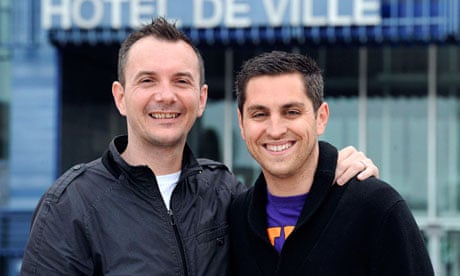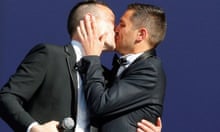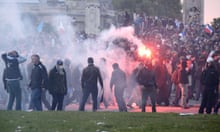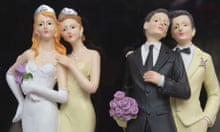It's being billed as France's "marriage of the century". The two grooms will wear suits, the vows will be simple and refer to two "spouses" but the normal wedding room at Montpellier town hall won't be big enough for the 200 friends and family, 300 guests from activist associations, 130 journalists from across the world and one government minister present so it will decamp to a larger function hall.
At 5.30pm in the southern French city of Montpellier, which describes itself as France's most gay-friendly place, after months of divisive national wrangling, numerous street demonstrations, 172 hours of heated parliamentary debate, and a warning of a 30% rise in homophobic acts, Vincent Autin and Bruno Boileau will become the first same-sex couple to marry in France.
After the gay marriage and adoption law was passed 10 days ago, Autin, 40, a gay rights activist who works for the Montpellier tourist office, and Boileau, 30, a civil servant, quickly published the banns, booked the outfits, organised the rings, the DJ, the car and the childcare for guests bringing children. They had long planned to be the first couple to marry when France became the 14th country in the world to legalise same-sex marriage – the key social reform of the Socialist François Hollande's presidency. Last September, the women's minister, Najat Vallaud-Belkacem, on a political visit to Montpellier, had asked Autin if he wanted to be the first groom. He immediately called Boileau who instantly said yes. The couple had been living together for seven years.
Autin and Boileau met online in 2006 on a fan site dedicated to the pop singer Christophe Willem, who had emerged from the TV show La Nouvelle Star, an equivalent of Britain's Got Talent. Some of the fans on the site agreed to meet up in Paris, and Autin and Boileau met and fell in love. Autin was a long-time gay rights campaigner in Montpellier. Boileau, who lived in Essonne, outside Paris, had not been out with a man before. He immediately came out to his parents, a former police officer and retirement home worker in rural north-west France, who were delighted he was happy. Autin's father died when he was 17 and he never had a chance to tell him he was gay. He told his mother he was gay when he was 16 and since then she has been a regular feature at gay pride, lobbying for the parents of gay children. During the demonstrations in favour of same-sex marriage, she carried a placard: "Proud to be mother to a gay son."
After they marry, Autin and Boileau would like to adopt a child.
Montpellier has a police presence on standby. There was going to be a live transmission of the wedding outside the town hall on a big screen, but for security reasons it will not take place. Hélène Mandroux, the Socialist mayor and activist for same-sex marriage, who will conduct the ceremony, said she had had threats by phone, including one man advising her to "get bodyguards".
Rights groups hope the pictures of the newlyweds splashed across all media will draw a line under the street demonstrations against same-sex marriage, political rows and clashes between opponents and police that have overshadowed the passing of the law. On Sunday, at the last major demonstration against same-sex marriage and adoption, more than 150,000 people marched through Paris and there were 293 arrests after clashes between riot police and far-right groups. Opposition to the law, which saw the biggest rightwing street demonstrations in France in decades, took ministers by surprise. The government has warned of a resurgence of far-right groups on the fringes of the protest movement. Tensions were exacerbated by the suicide last week of a far-right essayist, Dominique Venner, who shot himself dead at the alter of Paris's Notre Dame cathedral on Tuesday after leaving a blogpost railing against immigration and the "vile" law legalising same-sex marriage.
Boileau told Le Point that having a marriage in the media spotlight "might seem intimidating" but he added: "We try to always keep in our spirit the end aim, which is equality for all, that everyone can marry in their town."
Mandroux, the mayor, told the Nouvel Observateur the marriage was "not a political act. Through the union of Vincent and Bruno, we're living a major advance for society. A major discrimination is disappearing. As a doctor by profession, I've always felt that to be discriminated against because of sexual orientation was unacceptable. Vincent Autin says it's the victory of love over hate, and I can only agree."




